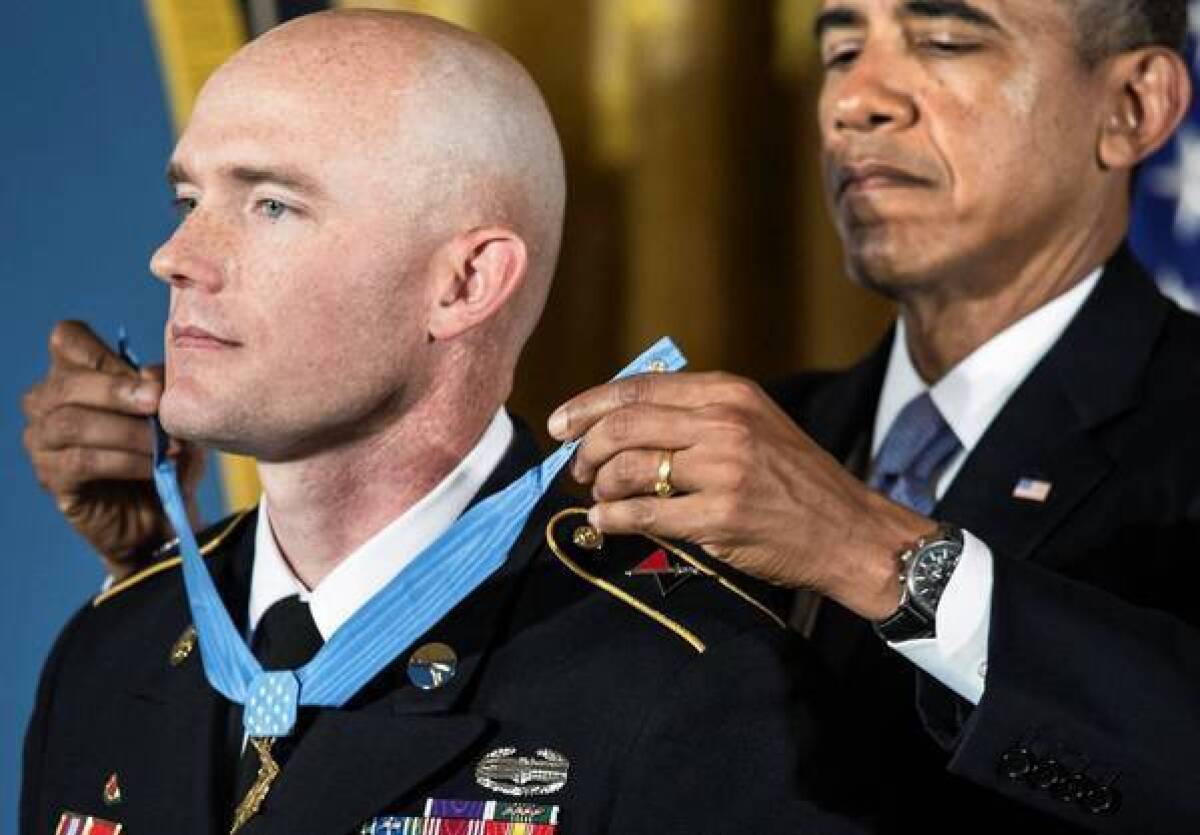Medal of Honor recipient urges support for PTSD

- Share via
WASHINGTON — Early on Oct. 3, 2009, more than 300 Taliban fighters attacked Combat Outpost Keating from the hills surrounding the small, remote U.S. Army base in eastern Afghanistan.
During the next 12 hours, machine-gun fire and rocket-propelled grenades rained down from every direction. The enemy penetrated the camp. Eight American soldiers were killed and 25 others injured as they battled to repel the invaders.
Amid the chaos, Staff Sgt. Ty Carter sprinted through a hail of bullets to resupply troops with ammunition, rescued a wounded soldier trapped under fire, and returned to fight after being hit by shrapnel.
The violent, tumultuous scene was recounted by President Obama on Monday during a White House ceremony awarding Carter the Medal of Honor, the nation’s highest military citation. Carter is the fifth living veteran of Afghanistan or Iraq to receive the medal for acts of valor above and beyond the call of duty; seven others have been awarded posthumously.
Obama commended Carter for his crucial role in the battle, calling it “the story of what our troops do for each other.”
“I will ask you, Ty, to never forget the difference that you made on that day,” Obama said. “Because you helped turn back the attack, soldiers are alive today.”
Among the guests at the ceremony were fellow survivors of the battle, loved ones representing those who died and more than 40 members of Carter’s family.
“If you want to know what a true American hero looks like, then you don’t have to look too far,” Obama told Carter’s children. “Your dad inspires us, just like all of those big monuments and memorials do.”
Carter, who spent much of his childhood in the Bay Area, is the second soldier from the unit at Combat Outpost Keating to receive the Medal of Honor. Staff Sgt. Clint Romesha was recognized in February. It is the first time in nearly 50 years that two survivors from the same battle have been awarded the citation.
Obama noted that those who served at Combat Outpost Keating were “among the most highly decorated ... of this entire war: 37 Army Commendation Medals, 27 Purple Hearts, 18 Bronze Stars for their valor, nine Silver Stars for their gallantry.”
Carter stood stoically onstage as Obama spoke. But when the president slipped the medal’s blue ribbon over his head, Carter broke into a wide grin.
“I promise the mothers, fathers and spouses of my fallen brothers that I will strive to live up to the responsibility that this medal brings,” he said in a statement after the ceremony. “I’m eager to represent the thousands who suffer from the invisible wounds of war.”
Since his citation was announced in July, Carter, who is stationed with his family at Joint Base Lewis-McChord near Seattle, has spoken openly of his struggle with post-traumatic stress disorder, which many veterans bring home after violent experiences in combat. He has said he wants to eliminate the stigma and shame that discourages soldiers from getting help.
Carter urged the American public to learn more about PTSD and the effect it can have on soldiers.
“Know that they are not damaged; they are simply burdened with living with what others do not,” he said. “We are resilient and will emerge stronger over time.”
It is rare for a soldier winning such a citation to speak so candidly about PTSD. In 2010, more than 30 recipients of the Medal of Honor participated in a public service announcement encouraging veterans to seek assistance in dealing with the disorder, but they did not share personal experiences of post-traumatic stress.
Obama applauded Carter’s honesty and called upon the country to do more to address the issue.
“Nobody should ever suffer alone,” he said. “And no one should ever die waiting for the mental health care they need. That’s unacceptable.”
Obama said Carter had mentioned another survivor from the battle at Combat Outpost Keating who struggled with PTSD.
“And he’s urged us to remember another soldier ... who suffered too, who eventually lost his own life back home, and who we remember today for his service in Afghanistan that day — Pvt. Ed Faulkner Jr.,” the president said.
He urged other PTSD sufferers to follow Carter’s example and get the help they need.
“Look at this man. Look at this soldier. Look at this warrior,” Obama said. “He’s as tough as they come. And if he can find the courage and the strength to not only seek help, but also to speak out about it, to take care of himself and to stay strong, then so can you.”
More to Read
Sign up for Essential California
The most important California stories and recommendations in your inbox every morning.
You may occasionally receive promotional content from the Los Angeles Times.










